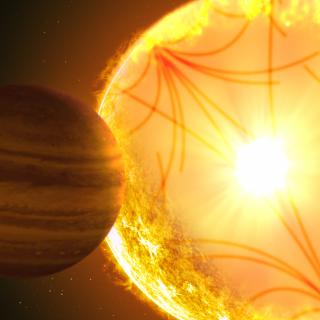Bibcode
Rabus, M.; Deeg, H. J.; Alonso, R.; Belmonte, J. A.; Almenara, J. M.
Bibliographical reference
Astronomy and Astrophysics, Volume 508, Issue 2, 2009, pp.1011-1020
Advertised on:
12
2009
Journal
Citations
43
Refereed citations
39
Description
Aims. The aim of this work is a detailed analysis of transit light
curves from TrES-1 and TrES-2, obtained over a period of three to four
years, in order to search for variabilities in observed mid-transit
times and to set constraints on the presence of additional third
bodies. Methods: Using the IAC 80 cm telescope, we observed
transits of TrES-1 and TrES-2 over several years. Based on these new
data and previously published work, we studied the observed light curves
and searched for variations in the difference between observed and
calculated (based on a fixed ephemeris) transit times. To model possible
transit timing variations, we used polynomials of different orders,
simulated O-C diagrams corresponding to a perturbing third mass, and we
used sinusoidal fits. For each model we calculated the χ2
residuals and the false alarm probability (FAP). Results: For
TrES-1, we can exclude planetary companions (>1 M⊕)
in the 3:2 and 2:1 MMRs having high FAPs based on our transit
observations from the ground. Likewise, a light time effect caused,
e.g., by a 0.09 M_&sun; mass star at a distance of 7.8 AU is possible.
As for TrES-2, we find a better ephemeris of Tc = 2 453
957.63512(28) + 2.4706101(18) × Epoch and a good fit for a sine
function with a period of 0.2 days, compatible with a moon around TrES-2
and an amplitude of 57 s, but it is not a uniquely low χ2
value that would indicate a clear signal. In both cases, TrES-1 and
TrES-2, we are able to put upper constraints on the presence of
additional perturbers masses. We also conclude that any sinusoidal
variations that might be indicative of exomoons need to be confirmed
with higher statistical significance by further observations, noting
that TrES-2 is in the field-of-view of the Kepler Space Telescope.
Photometric data for TrES-1 and TrES-2 are only available in electronic
form at the CDS via anonymous ftp to cdsarc.u-strasbg.fr (130.79.128.5)
or via http://cdsweb.u-strasbg.fr/cgi-bin/qcat?J/A+A/508/1011
Related projects

Helio and Astero-Seismology and Exoplanets Search
The principal objectives of this project are: 1) to study the structure and dynamics of the solar interior, 2) to extend this study to other stars (either single or in binary systems), 3) to search for extrasolar planets using photometric methods (primarily by transits of their host stars) and their characterization with complementary radial
Savita
Mathur